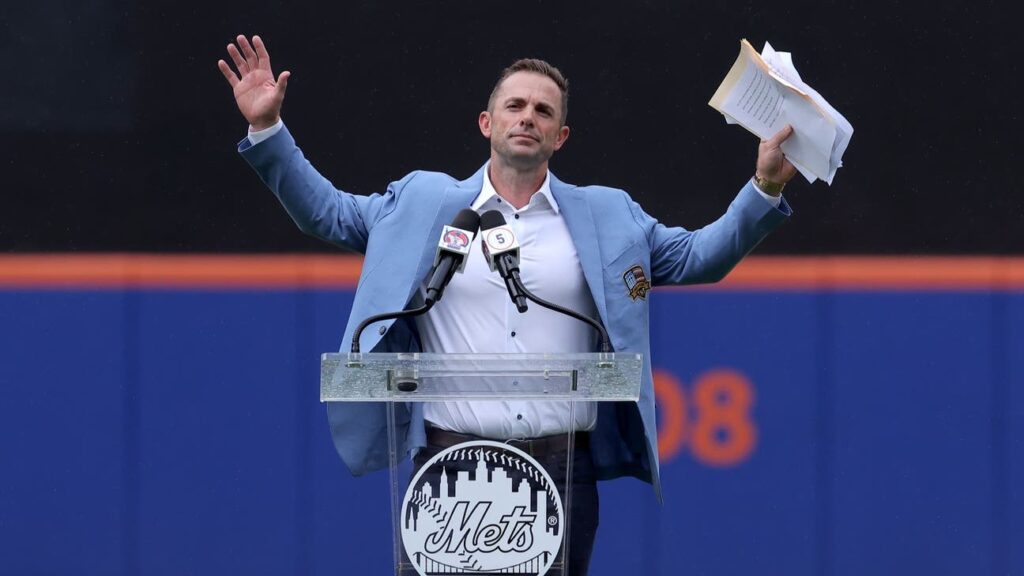David Wright said that Saturday felt like being back home after a long trip — ”when you’ve been away, seeing the familiar faces.”
It is true that this place — Metsland, both physical and spiritual — is a lifelong home for Wright, full of all the love and history that defines the word.
But the homecoming to mark Wright’s number retirement and induction into the Mets Hall of Fame was more than just a warm and fuzzy lovefest. It was a reminder that Wright’s impact on the organization remains tangible, even across vastly different eras, rosters and ownerships.
The years since Wright’s last game in 2018 have been ones of staggering turnover. And yet, his influence remains in the air.
Two of the young men who stand on the infield dirt in Wright’s former position can certainly feel it.
“I’ve gotten to speak with him a lot these past couple of years, and he’s an amazing guy,” Brett Baty said. “And I have seen what he has done for the organization and the type of leader he was.”
As a young player, Baty made a point to read Wright’s memoir, The Captain, written with Anthony DiComo.
“I read that book, and I was like, man, he was someone who everyone loved playing with, and who I would have loved playing with, too,” Baty says. “I could tell how hard a worker he was, and to bring that to the organization is huge, because that’s what everyone speaks on, how hard he worked. I didn’t witness it personally, obviously, but you know about it.”
“I grew up watching David Wright,” adds Mark Vientos. “My dad was a big Mets fan and the games were always on at home. He was the captain — and now being on the same team and playing the same position is an honor.”
It’s more than that, too. Wright has taken time in spring training to talk about the specifics of the position with Vientos. He left a lasting impression on a young David Peterson with a similar conversation about the game. He called Max Kranick, another lifelong Mets fan, when Kranick made the team out of spring training this year.
Wright has dabbled in an even more active type of involvement.
For a brief time, he was an influential member of the front office. He attended the 2018 Winter Meetings as part of then-GM Brodie Van Wagenen’s inner circle. After that, he scaled back to spend as much time as possible with his family in California.
Several GMs later, Billy Eppler wanted Wright to come back to the fold in time to help the organization choose a manager. But while Wright is happy to be involved from a distance, and occasionally in person, he maintains that family is the priority for now.
The Mets will be fortunate if Wright ever decides to increase his time and influence, as Carlos Beltran has by joining the front office. But fortunately for the team, Wright’s initial impact, the one he made as a player, remains impactful.
“No one exemplifies more what it means to be a Met than David Wright,” says Dave Racaniello, the Mets' longtime bullpen catcher and one of Wright’s closest friends.
“The way he goes about his business both on and off the field, with his head down and his lunch pail, I think that has played a big part in why he’s so popular. That blue-collar attitude resonates so much with the people of New York, and especially the people of Queens.”
As a longtime Met himself, Racaniello is positioned better than anyone to describe the specifics of the legacy that linger into the 2020s.
“Our head strength coach, Dustin Clarke, and [trainer] Brian Chicklo — these guys got here after David and, especially Dustin, has talked to me about how he remembers seeing David going about his business and thinking, ‘Okay, this is how it’s done here.’ And those expectations that Dustin now has for players were set because of how David conducted himself.
“So yes, the impact can run for generations.”
Read the full article here



